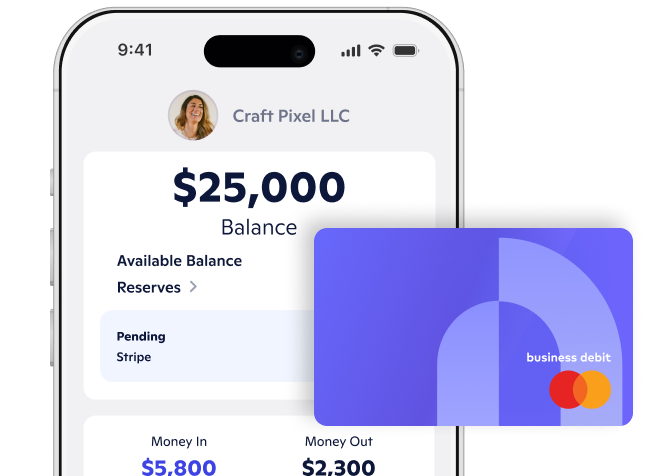
small business loan can help you finance expenses throughout every stage of your business, whether you're just starting or looking to invest further in your company. SBA loans are loans offered through banks and other lenders for small businesses partially guaranteed by the U.S. Small Business Administration.
Taking out a loan makes sense for some small business owners but may not be the right financing path for you. Luckily, there are several alternatives to SBA loans that may be a better option depending on your situation and needs. Keep reading to learn more about SBA loans and other options to consider when looking for funding.
What are SBA loans?
SBA loans are loans for small businesses available through approved lenders and backed by the U.S. Small Business Administration (SBA). The SBA doesn't lend directly to businesses. Instead, SBA-approved lenders, including banks, credit unions, and other financial institutions, provide loans to qualified borrowers. SBA loans range from $500 to $5.5 million. The SBA also caps how much interest lenders can charge on SBA loans.
Several SBA loan types are available to fit various business types and lending needs. Each loan type carries its own requirements and loan amounts:
- SBA 7(a) Loans
- SBA Express Loans
- SBA 504 Loans
- SBA Small Loans
- SBA International Trade Loans
- SBA Export Working Capital Loans
- SBA Export Express Loans
- Community Advantage
To be eligible for an SBA loan, you must meet the following requirements:
- Operate a for-profit business
- Do business in the U.S. or its territories
- Have reasonable owner equity to invest
- Use alternative financial resources, including personal assets, before seeking financial assistance
Lenders may require applicants to meet additional underwriting standards in addition to general SBA loan requirements. Depending on the lender chosen, your loan application may be subject to two approval processes — first through the lender and then through the Small Business Administration.
SBA loans feature a guaranty by the SBA. The SBA pledges to reimburse lenders a specific percentage of the loan balance if you default on your loan. By providing a guaranty, the SBA lowers the financial risk for lenders, improving a small business owner's chance of approval.
Pros and cons of SBA loans
Like most financing options, SBA loans have their merits and risks. Consider the following pros and cons if you're considering financing business expenses with an SBA loan.
Pros
- Broad borrower requirements: SBA loan eligibility requirements are fairly broad. Businesses that don't qualify for traditional loans may qualify for an SBA loan.
- Lower interest rates: SBA loans feature capped interest rates of a base rate plus an additional percentage by the lender subject to maximum limits.
- Predictable payments: SBA loans come with predictable monthly payments and favorable repayment terms.
- Wide range of loan types and amounts: There are several types of SBA loans available depending on your needs. Loan amounts range from $500 up to $5 million.
- Borrower support: The Small Business Administration operates several resource centers, including ones for minority and women business owners, that provide general assistance to small businesses, including help applying for an SBA loan.
Cons
- Usually require a down payment: Lenders typically require a down payment to secure SBA loan funds. Down payments can be up to 10 or 20% in some cases.
- May require collateral: Some lenders require borrowers to provide collateral to secure SBA loans to reduce the risk of lending.
- Lenders may have their own requirements: Many banks and other lenders may have specific requirements for eligibility beyond general SBA requirements.
- Approval process is slow: SBA loans can take upwards of two to three months to fund, depending on the lender.
- Borrowers with poor credit may not qualify: Lenders perform credit checks to assess the lending risk of borrowers. If your credit score is low, you may not qualify for a loan even with an SBA guaranty.
- High denial rate: SBA loan approval rates at big banks hit 14.7% in October of 2022, according to the Biz2Credit Small Business Lending Index Report. Approval rates at smaller banks and credit unions were slightly higher, at 21.2% and 20.4%, respectively.
Why It Might Make More Sense To Look Elsewhere For Small Business Funding
An SBA loan provides much needing funding for qualified borrowers but may not be a good fit for your needs. With other funding sources available, the best option may be to skip the SBA loan application process and look elsewhere. Here are some reasons why an SBA loan might not be suitable for you.
The rigorous SBA loan process: Applying for an SBA loan requires tons of paperwork and potentially making it through two approval processes.
You need access to funding soon: The SBA loan application process can often take several months before you receive funding. There's no way to speed up the process, so an SBA loan doesn't make sense if you need money for expenses now.
You don't meet underwriting requirements: Your business may not meet strict underwriting standards to qualify for an SBA loan.
Top Alternatives to SBA Loans
Term Loans
A term loan is a type of loan that is typically repaid in regular, equal payments over a set period of time. It is often used for larger purchases or investments, such as purchasing equipment, real estate, or expanding a business. Term loans can be secured, meaning they require collateral, or unsecured, and the interest rate can be fixed or variable.
- Pros: Term loans can be used for a variety of purposes, such as purchasing equipment or real estate, or for working capital. They can also have fixed or variable interest rates, and some can be secured or unsecured.
- Cons: Term loans may have strict repayment terms and require collateral, and some may also have prepayment penalties. Additionally, it can be difficult for some small business owners to qualify for a term loan.
Short-term Loans
A short-term loan is a loan that is intended to be repaid within a year or less. It is often used for working capital, inventory, or unexpected expenses. Short-term loans are generally easier to qualify for than a traditional term loan, but they may have higher interest rates and fees.
- Pros: Short-term loans can provide quick access to cash and have a shorter repayment period than a traditional term loan.
- Cons: Short-term loans may have higher interest rates and fees than a traditional term loan, and may also require a personal guarantee. Additionally, short-term loans may not provide as much financing as some small business owners need.
Merchant Cash Advances
A merchant cash advance is a type of financing in which a business accesses working capital and repays it with a portion of its daily credit card sales, or in structured payments on a fixed cadence (such as monthly). This can be a quick way for businesses with a steady flow of sales to access working capital. Repayment is often (but not required to be) based on a percentage of sales, so it can be flexible for businesses with fluctuating sales.
- Pros: Merchant cash advances can be a quick way to access funding, and they do not require collateral. They also have flexible repayment terms, which can be beneficial for businesses with fluctuating sales.
- Cons: Merchant cash advances can have high interest rates, and they can be expensive if a business's sales do not meet the expected projections. Additionally, merchant cash advances may not be available to all types of businesses.
Business Lines of Credit
A business line of credit is a type of credit that allows a business to borrow money up to a certain limit, and pay interest only on the amount borrowed. This type of financing can be useful for managing cash flow, and can be used for a variety of purposes. The lender will review the business's creditworthiness and may require collateral to be eligible.
- Pros: Business lines of credit can provide a flexible source of funding for a business, and can be used for a variety of purposes. Additionally, a business line of credit can be a useful tool for managing cash flow. As borrowed funds are paid back, it replenishes the total line of credit.
- Cons: Business lines of credit may require collateral and may also have fees. Additionally, a business's creditworthiness will be a factor in determining its ability to qualify for a line of credit.
Equipment or Inventory Financing
Equipment or inventory financing is a type of loan that is used to purchase equipment or inventory for a business. This type of financing can help a business acquire the assets it needs to operate and grow. The equipment or inventory being financed may be at risk if the loan is not repaid, and the interest rate may be higher than a traditional loan.
- Pros: Equipment or inventory financing can help a business acquire the assets it needs to operate and grow. Additionally, financing equipment or inventory can help a business preserve cash.
- Cons: Equipment or inventory financing may require collateral, and the equipment or inventory being financed may be at risk if the loan is not repaid. Additionally, the interest rate may be higher than a traditional loan.
Invoice Factoring
Invoice factoring is a type of financing in which a business sells its accounts receivable to a factoring company at a discount in order to receive cash more quickly. This can be a useful tool for managing outstanding invoices, and can help a business improve its cash flow. Factoring companies may require a personal guarantee or a lien on the business's assets, and the cost can be higher than other forms of financing.
- Pros: Invoice factoring can provide quick access to cash, and it often does not require collateral. Additionally, invoice factoring can help a business improve its cash flow and manage its outstanding invoices.
- Cons: Invoice factoring can be expensive, and it may not be available to all types of businesses. Additionally, the factoring company may require a personal guarantee or a lien on the business's assets.
What's the Best Option for Your Business?
Business owners have several options available to help fund expenses large and small. Lenders are willing to work with you and provide the necessary funds to meet borrowing requirements, whether you're upgrading equipment, need funds to cover unexpected expenses or funding start-up costs.
Scores of business owners turn to SBA loans, but with high denial rates, other funding sources may be better in the short and long term. Consider your business needs, your credit and financial history, and your business’s overall health to determine which options to pursue. Shop around to find the best rates and terms to fit your needs and goals.
Novo Platforms Inc. strives to provide accurate information but cannot guarantee that this content is correct, complete, or up-to-date. This page is for informational purposes only and is not financial or legal advice nor an endorsement of any third-party products or services. All products and services are presented without warranty. Novo Platforms Inc. does not provide any financial or legal advice, and you should consult your own financial, legal, or tax advisors.
%201.png)
.png)




